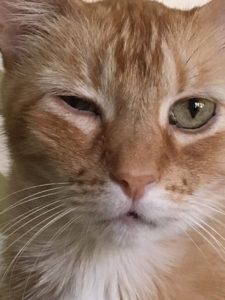Feline herpesvirus (FHV) is a highly contagious, species-specific virus that causes viral rhinotracheitis (FVR), an upper respiratory infection. It is a common virus that can affect cats of all ages, including wild cats.
Causes of Feline Herpesvirus Infection
Feline herpesvirus is transmitted through direct contact with virus particles. Uninfected cats can contract the virus by coming into contact with discharge from an infected cat’s eyes, mouth, or nose.
Common ways for infection to occur include sharing litter boxes and food dishes, inhalation of virus particles in the air, and mutual grooming. This is why cats that live in a multi-cat household are at greater risk of contracting the virus. Cats with a weakened immune system are also more susceptible to feline herpesvirus infection.
Symptoms of Feline Herpesvirus
Please visit your veterinarian immediately if your cat displays any of the following signs and symptoms of feline herpesvirus infection.
- Sneezing
- Discharge from the nose or eyes
- Coughing
- Conjunctivitis (pink eye)
- Nasal congestion
- Eye ulcers
- Fever
- Depression
- Loss of appetite
Diagnosis of Feline Herpesvirus Infection
If feline herpesvirus infection is suspected, your veterinarian will look at your cat’s medical history and perform a physical examination to check for clinical signs of infection. Samples of discharge from your cat’s nose or eyes may be taken for laboratory analysis. A polymerase chain reaction (PCR) test may also be used to detect upper respiratory pathogens and reach a conclusive diagnosis of feline herpesvirus infection.
Treatment of Feline Herpesvirus Infection
There is no known cure for feline herpesvirus infection, but symptoms can be treated effectively. Your veterinarian may prescribe antibiotics and antiviral medications to ease symptoms and treat secondary bacterial infections. Conjunctivitis and eye irritation can be treated with medicated creams or eye drops.
It is important to feed a healthy and balanced diet to support your cat’s immune system and help them fight off infection. Some cats may need inpatient treatment to receive nutritional and fluid support while recovering.
Additionally, your veterinarian may suggest other treatment methods to minimize your cat’s symptoms such as using a humidifier at home to ease nasal congestion. Please follow your veterinarian’s treatment advice closely to help your cat recover as quickly as possible.
Prevention of Feline Herpesvirus Infection
Vaccination is the best way to minimize your cat’s risk of contracting feline herpesvirus. For this reason, the FHV vaccine is considered a core vaccine that should be administered to kittens and kept up-to-date with boosters throughout a cat’s lifetime. Please consult with your veterinarian to discuss vaccination options to protect your cat


